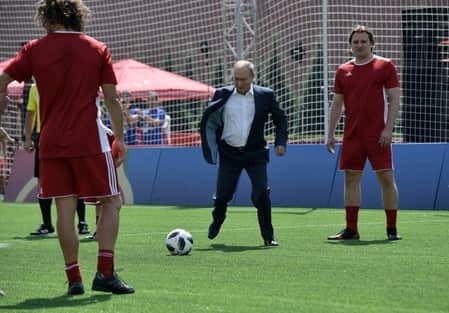The World Cup is one of the great festivals of humanity, where millions coalesce, mingle and learn from each other.
This was clear at an amateur five-a-side tournament played in Moscow’s Red Square on Friday at a makeshift artificial pitch near the gates of the Kremlin.
A team representing Australia faced Russia and although the match was played fiercely, there were plenty of helping hands when opponents were knocked to the ground.
“The first thing we learned from hosting this World Cup is that people from other countries who have come here are very amicable and friendly,” said one member of the Russian team named Arkady.
Another, Alexei, said having over one million foreign guests in his country had given him another perspective on the world.
“The different mentalities here because of the World Cup help build friendships between our nations,” he said.
As the curtains begin to close on this month-long tournament, focus inevitably shifts to what the World Cup’s legacy will be in Russia.
There is of course the economic benefit of hosting the world's biggest sports event, albeit short-term. And while life in Moscow and St Petersburg hasn't skipped a beat since the first ball was kicked in June, most of the other 11 host cities have seen dramatic investment in infrastructure, from roads to transportation to airports.
But on the intangible benefits, the message from FIFA has been unequivocal.
"I think that a lot of preconceived opinions [about Russia] have changed with and thanks to this World Cup because everyone has seen the true nature of all the people," said FIFA President Gianni Infantino.
Indeed, the successful hosting of the World Cup has seen Russia’s image improve after years of deteriorating ties with the West.

There had been concerns about Russia’s human rights record, its annexation of Crimea and its alleged election interference in the United States. Not to mention the fears of hooliganism, homophobia and racism.
“If football and the World Cup can contribute to open some channels, to open some discussion to help those who have to take the important decisions for our world, to at least start to speak to each other and start to realise that there are people living all over the world, some in better, some in worse conditions, then I think we have already done something,” Mr Infantino said.
But rights groups say Russia should be judged on its commitment to human rights and the rule of law in the weeks, months and years after the World Cup.
“Now that the World Cup is almost over life will resume in Russia, business as usual and migrants are not welcome, religious minorities are not welcome, dissidents are still in detention,” said Tanya Lokshina from Human Rights Watch’s Moscow office.
Though Ms Lokshina admited the World Cup could force more ordinary Russians to question what she called the Kremlin’s isolationist policies.
“Lay people in Russia could start thinking, ‘so all those foreigners, they’re not enemies, they’re just like ourselves and they enjoy their football and they’re nice to hang out with, so we are not surrounded by enemies'."

